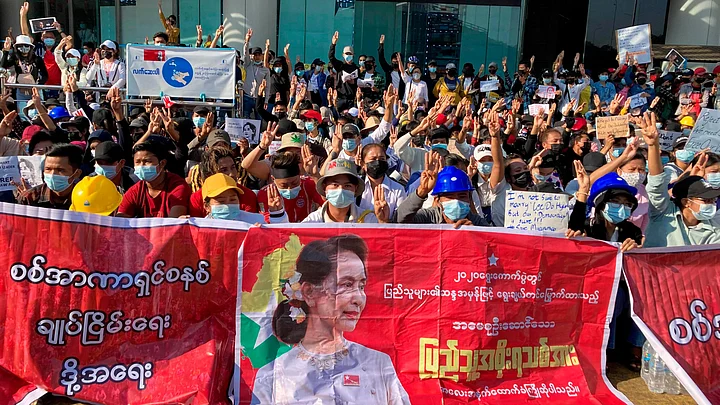Myanmar's junta on Monday, 15 February, intensified the clampdown on pro-democracy protestors by cutting the nation's internet access and deploying extra troops around the country. However, the demonstrators refused to stay silent and continued their protests on streets.
The military government imposed around an eight-hour-long internet blackout on Monday, and deployed more troops in several parts of the country including in Myanmar’s biggest city and commercial epicentre Yangon.
Armoured personnel carriers were also deployed near the central bank.
The military has steadily escalated efforts to quell an uprising against their seizure of power two weeks ago, which saw civilian leader Aung San Suu Kyi detained along with hundreds, including members of her democratically elected government, news agency AFP noted.
New Protests Erupt
On Monday, protests took place in Yangon including near the central bank, AFP reported.
According to a report by an AFP journalist, hundreds of engineering and technology students protested in the city’s northern district, while the southern city of Dawei also saw a rally. Hundreds of protesters were walking alongside a marching band.
Some banners in protest against the military rule read: "They kill in (the) day. They steal at night. They lie on TV,” AFP reported.
NetBlocks a monitoring group reported that a "state-ordered information blackout" had taken the country nearly entirely offline, but services began resuming around the start of the working day.
"Network data show national connectivity rising to ordinary levels after information blackout," NetBlocks reported, after eight hours of the blackout.
However, the monitor informed that most users in Myanmar still couldn’t access social media.
On 1 February, the military detained Aung San Suu Kyi, the democratically-elected civilian leader and her political allies for a coup, ending a decade-old developing democracy after generations of junta rule.
(With inputs from AFP)
(At The Quint, we question everything. Play an active role in shaping our journalism by becoming a member today.)
